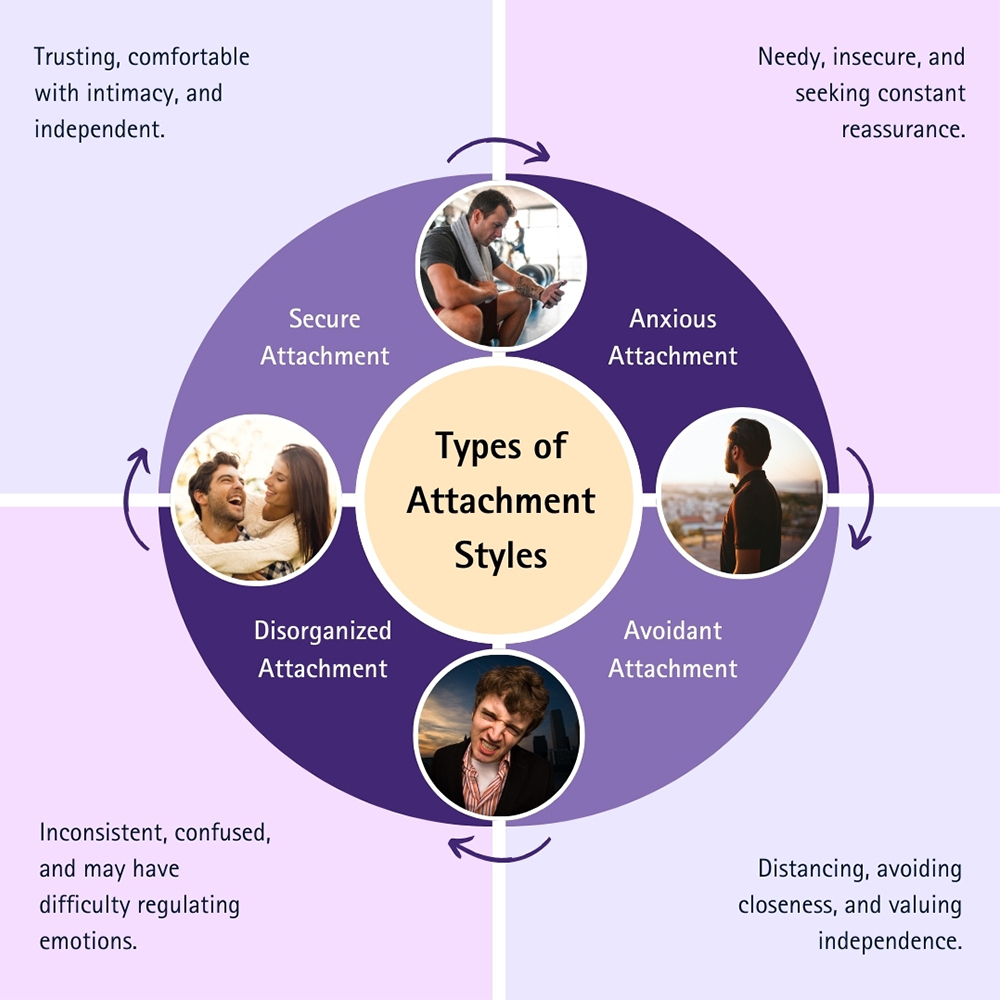 What is Attachment Style Therapy?
What is Attachment Style Therapy?
Attachment theory was developed by Mary Ainsworth and John Bowlby to explain human bonding. They believed that the attachment between mother and baby heavily influences the child’s emotional and mental development. The researchers believed that mental disorders could be traced back to separations from or inconsistent or harsh treatment from the mother.
Children grow up healthy and thrive when they experience love and nurturing, security, responsive interaction, and encouragement for exploration. Without these crucial aspects of child and mother attachment, the child’s development can have severe and long-lasting consequences.
In therapy, your counselor can help you use this theory to understand your attachment style, helping you recognize your typical relationship patterns and work toward developing a more secure attachment.
Contact our therapists today for attachment style therapy in West Palm Beach and start healing attachment wounds and improving your relationships with a secure attachment.
Online Therapy or Virtual Consultations
Understanding Attachment Styles
Secure Attachment
A secure attachment style results from a healthy attachment between the mother and baby. Researchers believe for a child to grow up with a secure attachment style, the baby requires physical contact with the mother. A mother’s response to the baby’s cries creates a healthy, secure attachment.
A baby who feels safe, supported and encouraged to explore leads to an adult with a secure attachment.
Individuals with attentive mothers can grow up mentally healthy and develop secure relationships with others in adulthood.
Even if you didn’t have an attentive or relaxed mother growing up, you can still develop a secure attachment through counseling at our centers in West Palm Beach. Liz brings specialized trauma training to sessions and creates a supportive environment allowing you to reshape childhood patterns.

Avoidant Attachment
People with an avoidant attachment style try to minimize closeness and emotional intimacy with others. These people learned early on that trying to become close to others leads to disappointment or regret.
These are usually people who had avoidant mothers as babies. When the baby would cry, the mother would fail to soothe the baby. The baby learned that depending on or trying to be close to others is unsafe because it leads to being let down.
If you experience difficulty trusting others, emotional distance, or fear of intimacy, you may have an avoidant attachment style.
Anxious Attachment
While avoidant attachment describes someone who rejects intimacy, those with anxious attachment styles have a heightened need for it. This need comes from a fear of rejection from others. This may lead to feelings of jealousy and insecurity.
Babies who receive inconsistent support and physical contact with their mothers develop this attachment style. When the mother is inconsistent, the baby and the adult grow up not trusting others. While they crave connection to others, they also fear losing it and may act in ways that jeopardize their relationships.Characteristics of anxiously attached individuals include clinginess, neediness, and jealousy.
Disorganized Attachment
People with disorganized attachment styles are said to have a combination of avoidant and anxious behaviors. These people want intimate relationships, but when people get too close, they sabotage.
They may have conflicting behaviors which may confuse their loved ones.
These babies are usually the children of parents with trauma. The mom pro
vides inconsistent responses to the baby’s cries. At times, the caregiver can have been frightening, intimidating, disoriented, even abusive or neglectful.
People with this attachment style typically experience inconsistency, unpredictability, and difficulty regulating emotions.
How Attachment Styles Impact Relationships
The attachment theory states that our attachment style, formed during the first few years of life, affects our relationships throughout life.
Here is how each attachment style manifests itself in relationships:
- Secure attachment: Adults with a secure attachment style have healthy relationships. They confidently express their emotions, communicate, and set boundaries.
- Anxious attachment: Adults with an anxious attachment style cling to relationships. They may experience jealousy, clinginess, and people-pleasing tendencies,
- Avoidant attachment: Adults with an avoidant attachment style are overly independent. They may inadvertently push people away with their guarded behavior.
- Disorganized attachment: Adults with a disorganized attachment style crave close relationships, but they sabotage them. They usually experience chaotic relationships due to fear of abandonment.
Through compassionate attachment-style counseling in West Palm, you can heal your attachment and learn to create healthy, loving relationships.
Attachment Styles Therapy in West Palm Beach
Some therapy interventions commonly used at the Trauma Therapy Center for attachment counseling include:
- Cognitive Behavioral Therapy (CBT): This therapy helps you identify and reframe the negative beliefs that may affect your attachments in relationships.
- Narrative Therapy: This therapy helps clients identify their narratives and change their perceptions of situations.
- Attachment-Based Art Therapy: Art therapy can help clients identify emotions in a nonverbal way that may be experienced subconsciously.
- Somatic Regulation: This therapy helps clients identify ways to relax their muscles to regulate their emotions.
- Psychodynamic Therapy: This therapy explores subconscious thoughts and underlying core beliefs that may influence relationship behaviors.
- Family therapy: An excellent option for clients who have family members who are willing to participate in therapy. In our experience, clients who have the support of their families are the most successful in therapy.
- Dialectical behavior therapy (DBT): This therapy helps you learn distress tolerance skills to better cope with challenges.
- Couple’s therapy: A great option if you notice your attachment issues manifesting in your relationship and would like to work through them with your partner.
With compassionate and confidential therapy, you can heal your attachment disorder and adopt a secure attachment style.
Call us today for a free consultation to find attachment-style therapy in Palm Beach County.
For more information about our counselors or to schedule an appointment with an attachment style therapist, call the therapy center.
(561) 363-7994The Benefits of Attachment Style Therapy
Attachment therapy can improve your relationships with others, whether romantic, with family, or at work.
The benefits of attachment therapy include:
- Emotional regulation: Learning to listen to and control your emotions will help you act more rationally and react more productively to stressful situations.
- Increase self-esteem: Understanding and healing your attachment style will help you be more confident in your actions when you know they are coming from a healed place. You will also better understand yourself and learn how to love and care for yourself.
- Improved communication: Healing your attachment style can help you communicate better with the people in your life. You will begin to understand what you are looking for in relationships, set boundaries, and communicate your needs.
- Resolve trauma: A significant amount of our trauma stems from our attachment style. Healing these situations will help improve your overall mental health and well-being.
Your therapist will tailor your attachment counseling specifically to your needs and situation. Look for someone who specializes in attachment styles and trauma therapy.
Finding the Right Therapist for You
Here are some things to look for in an attachment-based therapist:
- Training: Make sure your therapist is qualified and is either a Licensed Clinical Social Worker (LCSW), Licensed Mental Health Therapist (LMHT), or Licensed Marriage and Family Therapist (LMFT).
- Experience: Liz believes that a therapist who has experienced and healed through the same issues you are currently experiencing is the most helpful.
- Therapeutic alliance: Building a therapeutic relationship based on trust and understanding is the most important part of helping her clients.
- Trauma-based approach: Based on our experience at our center, having a therapist who utilizes a trauma-based approach has the highest success rates in helping their clients improve their mental health and attachment issues.
If you’re looking for an intuitive and caring therapist like Liz, call our office today to speak with someone who can help you improve your well-being.
What to Expect in Attachment Style Therapy Sessions
Therapy with Liz offers a unique approach to understanding and healing attachment styles.
Liz recognizes the profound impact of early childhood experiences on your current relationships. Through compassionate and insightful conversations, you’ll gain a deeper understanding of your attachment style and how it shapes your interactions with others.
Here’s what you can expect in attachment style therapy:
- Comfortable and safe space: Liz creates a warm and supportive environment where you can openly share your thoughts and feelings without judgment.
- Personalized approach: Your therapy sessions will be tailored to your needs and goals.
- Skill-building: Learn practical tools and techniques to improve your mental health, communication skills, emotional regulation, and relationship dynamics.
- Goal-setting: Collaborate with Liz to set achievable goals for your personal and relational growth.
- Ongoing support: Receive ongoing support and guidance as you work towards building healthier and more fulfilling relationships.
With attachment counseling led by our skilled trauma therapists, you can unlock a secure attachment. Through techniques such as REBT, CBT, and EMDR, you can transform your attachment style and rewrite your emotional narrative. Begin your healing journey today in West Palm Beach, FL, and embrace a future filled with healthier relationships and inner harmony. Our therapists are fully committed to your healing.
Sources: Contributions of Attachment Theory and Research: A Framework for Future Research, Translation, and Policy by Jude Cassidy, Jason D Jones, and Phillip R Shaver

